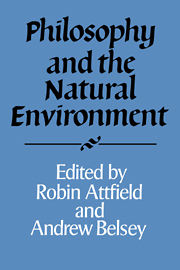Book contents
- Frontmatter
- Contents
- Preface
- Notes on Contributors
- Introduction
- Value in Nature and the Nature of Value
- Ecology and the Ethics of Environmental Restoration
- Rehabilitating Nature and Making Nature Habitable
- Personalistic Organicism: Paradox or Paradigm?
- Values, Reasons and the Environment
- Awe and Humility: Intrinsic Value in Nature. Beyond an Earthbound Environmental Ethics
- The End of Anthropocentrism?
- Global Religion
- Kant and the Moral Considerability of Non-Rational Beings
- The Idea of the Environment
- Chaos and Order, Environment and Anarchy
- Natural Capital
- Some Philosophical Assessments of Environmental Disobedience
- Global Environmental Justice
- Environmental and Medical Bioethics in Late Modernity: Anthony Giddens, Genetic Engineering and the Post-Modern State
- Highlights and Connections
- Bibliography
- Index
Global Religion
Published online by Cambridge University Press: 19 October 2009
- Frontmatter
- Contents
- Preface
- Notes on Contributors
- Introduction
- Value in Nature and the Nature of Value
- Ecology and the Ethics of Environmental Restoration
- Rehabilitating Nature and Making Nature Habitable
- Personalistic Organicism: Paradox or Paradigm?
- Values, Reasons and the Environment
- Awe and Humility: Intrinsic Value in Nature. Beyond an Earthbound Environmental Ethics
- The End of Anthropocentrism?
- Global Religion
- Kant and the Moral Considerability of Non-Rational Beings
- The Idea of the Environment
- Chaos and Order, Environment and Anarchy
- Natural Capital
- Some Philosophical Assessments of Environmental Disobedience
- Global Environmental Justice
- Environmental and Medical Bioethics in Late Modernity: Anthony Giddens, Genetic Engineering and the Post-Modern State
- Highlights and Connections
- Bibliography
- Index
Summary
Whose Problem?
The social and environmental problems that we face at this tail end of twentieth-century progress require us to identify some cause, some spirit that transcends the petty limits of our time and place. It is easy to believe (or to pretend to ourselves that we believe) that there is no crisis. We have been told too often that the oceans will soon die, the air be poisonous, our energy reserves run dry; that the world will grow warmer, coastlands be flooded and the climate change; that plague, famine and war will be the necessary checks on population growth. But here we are: sufficiently healthy and well-fed, connoisseurs of far-off catastrophe and horror movies, confident that something will turn up or that the prophecies of doom were only dreams. We are the descendants, after all, of creatures who did not despair, who hoped against hope that there would still be life tomorrow. We no more believe in the world's end than we believe that soldiers could break down the door and drag us off to torture and to death: we don't believe that they could even when we know that, somewhere altogether elsewhere, they did. Even if we can force ourselves to remember other ages, other lands or other classes, we are content enough.
Our resilience is reinforced by images of seasonal adjustment and return. Such changes as we can make ourselves admit are bound to be temporary.
- Type
- Chapter
- Information
- Philosophy and the Natural Environment , pp. 113 - 128Publisher: Cambridge University PressPrint publication year: 1994
- 2
- Cited by



